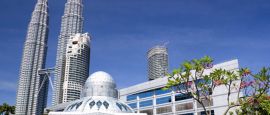Malaysia Health Care and Vaccinations
| Title | Special precautions |
|---|---|
| Diphtheria |
Sometimes |
| Hepatitis A |
Sometimes |
| Malaria |
Note 2 |
| Rabies |
Sometimes |
| Tetanus |
Sometimes |
| Typhoid |
Sometimes |
| Yellow Fever |
Note 1 |
Malaysia has a well-developed healthcare system, complete with modern facilities and highly qualified medical professionals. The country has a mix of public and private healthcare services, with private hospitals often preferred by foreign visitors for their shorter waiting times, advanced equipment, and English-speaking staff. Major cities like Kuala Lumpur, Penang, and Johor Bahru are home to internationally accredited hospitals. Malaysia is also a growing hub for medical tourism, offering affordable and high-quality medical treatments ranging from cosmetic procedures to complex surgeries, attracting patients from around the globe.
Public healthcare facilities are available across Malaysia, but they are primarily geared toward serving the local population. While affordable, public hospitals can experience longer waiting times, making them less convenient for tourists. However, public hospitals in urban areas are well-equipped to handle emergencies.
Medical costs in Malaysia are relatively affordable compared to many Western countries, particularly in private facilities. Travel insurance is strongly recommended, as it covers unexpected medical expenses, including emergency evacuation if necessary.
Pharmacies are widely available, especially in urban centres, and over-the-counter medications are easy to access. For prescription medications, visitors may need to consult a doctor first. It is advisable to bring a sufficient supply of any essential medications, along with a copy of your prescription.
Tap water in Malaysia is generally safe for cooking and cleaning but is not recommended for drinking without boiling or filtration, especially for foreign visitors unaccustomed to local water supplies. Bottled water is widely available and affordable.
When it comes to food, Malaysia's vibrant street food scene is a highlight, but visitors should exercise caution. Choose stalls with high turnover and freshly cooked food to minimise the risk of foodborne illnesses. Wash fruits and vegetables with bottled or boiled water and avoid raw or undercooked seafood, particularly in rural or less hygienic areas.
Visitors to Malaysia should be mindful of dengue fever, which is transmitted by Aedes mosquitoes and is more common in urban and suburban areas, particularly during the rainy season. There is no vaccine for dengue, so precautionary measures such as wearing insect repellent, long-sleeved clothing, and using mosquito nets are essential.
Heat-related illnesses, such as dehydration or heatstroke, can also affect travellers due to Malaysia's tropical climate. Staying hydrated, wearing lightweight clothing, and avoiding prolonged sun exposure are crucial.
Do you have any Feedback about this page?
© 2026 Columbus Travel Media Ltd. All rights reserved. No part of this site may be reproduced without our written permission, click here for information on Columbus Content Solutions.








 You know where
You know where
